Take Action on Militarism: website and resource pack
October 2017
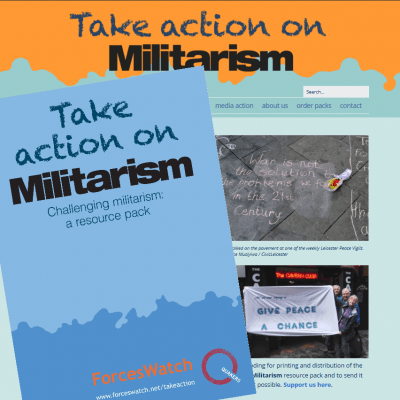 ForcesWatch have teamed up with Quaker Peace & Social Witness to produce a resource pack to help people take action on militarism in their communities. And there is a website to go with it where you can download the pack or order a hard copy, find links to more resources etc.
ForcesWatch have teamed up with Quaker Peace & Social Witness to produce a resource pack to help people take action on militarism in their communities. And there is a website to go with it where you can download the pack or order a hard copy, find links to more resources etc.
Armed forces visits to schools in Scotland: An update for 2016-2017
November 2017
This ForcesWatch briefing analyses data on armed forces visits to schools in Scotland for 2016-17.
The First Ambush: Effects of army training and employment
June 2017
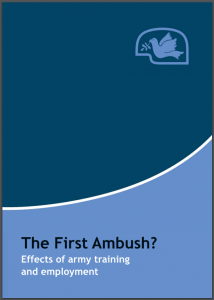 This report from Veterans For Peace UK details how the Army's training process has a forceful impact on attitudes, health, and behaviour even before recruits are sent to war. The findings show that military training and culture combine with pre-existing issues (such as a childhood history of anti-social behaviour) to increase the risk of violence and alcohol misuse. Traumatic war experiences further exacerbate the problem.
This report from Veterans For Peace UK details how the Army's training process has a forceful impact on attitudes, health, and behaviour even before recruits are sent to war. The findings show that military training and culture combine with pre-existing issues (such as a childhood history of anti-social behaviour) to increase the risk of violence and alcohol misuse. Traumatic war experiences further exacerbate the problem.
Soldiers at 16 – The other side of the story
January 2017
Should the military be promoted in schools?
updated 2017
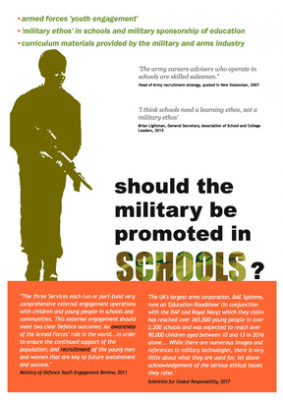 The armed forces have a growing involvement in secondary schools, colleges and even primary schools. While the Army, Navy and RAF have long run activities in schools as part of the Ministry of Defence's Youth Engagement programme, the Department for Education promotes 'military ethos' within education, and parts of the armed forces, along with the arms industry, are developing their involvement with curriculum provision and sponsorship of education institutions. This A4 leaflet (updated 2017) outlines the issue and what the concerns are.
This A4 leaflet (updated 2017) outlines the issue and what the concerns are.
The armed forces have a growing involvement in secondary schools, colleges and even primary schools. While the Army, Navy and RAF have long run activities in schools as part of the Ministry of Defence's Youth Engagement programme, the Department for Education promotes 'military ethos' within education, and parts of the armed forces, along with the arms industry, are developing their involvement with curriculum provision and sponsorship of education institutions. This A4 leaflet (updated 2017) outlines the issue and what the concerns are.
This A4 leaflet (updated 2017) outlines the issue and what the concerns are.
Does the military give young people a ‘leg up’? The armed forces and social mobility
May 2017
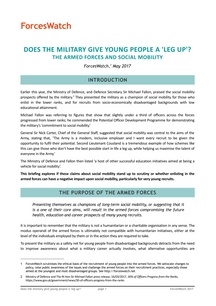
This briefing explores if these claims about social mobility stand up to scrutiny or whether enlisting in the armed forces can have a negative impact upon social mobility, particularly for very young recruits.
Answering difficult questions about militarism
February 2017
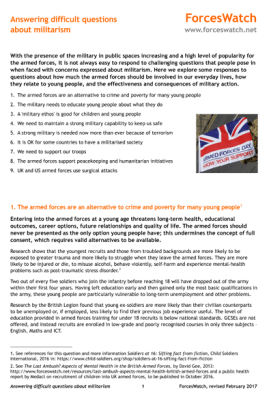 With the presence of the military in public spaces increasing and a high level of popularity for the armed forces, it is not always easy to respond to challenging questions that people pose in when faced with concerns expressed about militarism. In this briefing we explore some responses to questions about how much the armed forces should be involved in our everyday lives, how they relate to young people, and the effectiveness and consequences of military action.
With the presence of the military in public spaces increasing and a high level of popularity for the armed forces, it is not always easy to respond to challenging questions that people pose in when faced with concerns expressed about militarism. In this briefing we explore some responses to questions about how much the armed forces should be involved in our everyday lives, how they relate to young people, and the effectiveness and consequences of military action.
Science for Society
January 2017
 Science4Society Week is a collection of science education activities, co-ordinated by Scientists for Global Responsibility, and designed to inspire young people. It takes place in March each year.
Science4Society Week is a collection of science education activities, co-ordinated by Scientists for Global Responsibility, and designed to inspire young people. It takes place in March each year.
Is it Counterproductive to Enlist Minors into the Army?
December 2016
This article, written by Child Soldiers International and published in the Royal United Service Institute Journal, argues that raising the UK enlistment age from 16 to 18 would bring benefits to young people and the British armed forces. The article explains that the UK’s low enlistment age is counterproductive internationally, as it implies to other countries that it is acceptable to use children under the age of 18 to staff national armed forces.
Quakers in Britain
 The Quakers work on peace education, as well as other peace issues - carrying it out in schools and promoting it as a necessary part of the curriculum.
See here for current Quaker projects, peace education resources and their partner organisations.
The Quakers work on peace education, as well as other peace issues - carrying it out in schools and promoting it as a necessary part of the curriculum.
See here for current Quaker projects, peace education resources and their partner organisations.
Rethinking Remembrance in Schools
November 2016
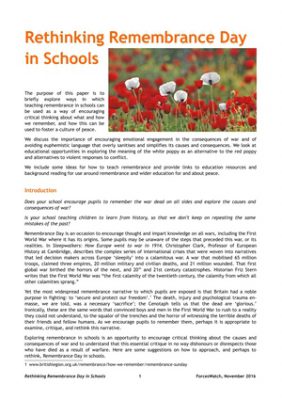 This paper, published by ForcesWatch, explores ways in which teaching remembrance in schools can be used as a way of encouraging critical thinking about what and how we remember, and how this can be used to foster a culture of peace.
This paper, published by ForcesWatch, explores ways in which teaching remembrance in schools can be used as a way of encouraging critical thinking about what and how we remember, and how this can be used to foster a culture of peace.
Talks about militarism from MAW Youth conference
October 2016
The Recruitment of Children by the UK Armed Forces: a Critique from Health Professionals
October 2016
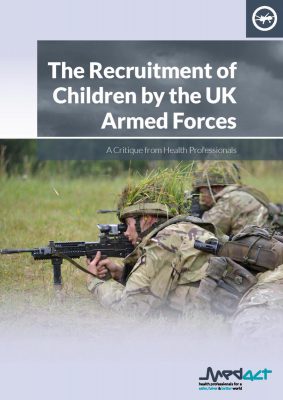 Medact’s report on the long-term impacts of the British military’s recruitment of children under the age of 18, presents evidence linking ‘serious health concerns’ with the policy, and calls for a rise in the minimum recruitment age. It looks at the psychological and psychosocial vulnerabilities of adolescents in the context of military recruitment marketing strategies and making long-term risky decisions and examines the evidence that under 18 recruits face greater risks to health than adult recruits, across the course of an armed forces career.
Medact’s report on the long-term impacts of the British military’s recruitment of children under the age of 18, presents evidence linking ‘serious health concerns’ with the policy, and calls for a rise in the minimum recruitment age. It looks at the psychological and psychosocial vulnerabilities of adolescents in the context of military recruitment marketing strategies and making long-term risky decisions and examines the evidence that under 18 recruits face greater risks to health than adult recruits, across the course of an armed forces career.
UN observations on UK and childrens’ rights
June 2016
The Committee on the Rights of the Child recently reviewed the UK's position on implementing the articles and protocols of the Convention on the Rights of the Child. They made a number of recommendations relating to the armed forces recruitment of under-18s and the military's activities in schools.
Soldiers at 16: Sifting fact from fiction
March 2016
 Published by Child Soldiers International, this short and accessible booklet addresses questions often raised about under-18s in the armed forces, presenting the facts - based on extensive research - rather than the fiction. Also contains very useful quotes and statistics. Great when talking to your MP or for those thinking of enlisting!
Published by Child Soldiers International, this short and accessible booklet addresses questions often raised about under-18s in the armed forces, presenting the facts - based on extensive research - rather than the fiction. Also contains very useful quotes and statistics. Great when talking to your MP or for those thinking of enlisting!
